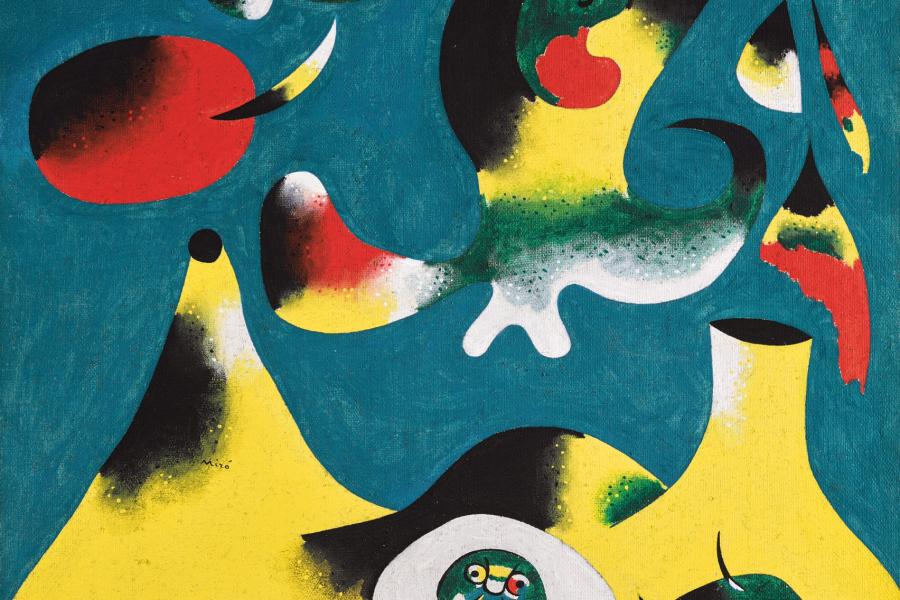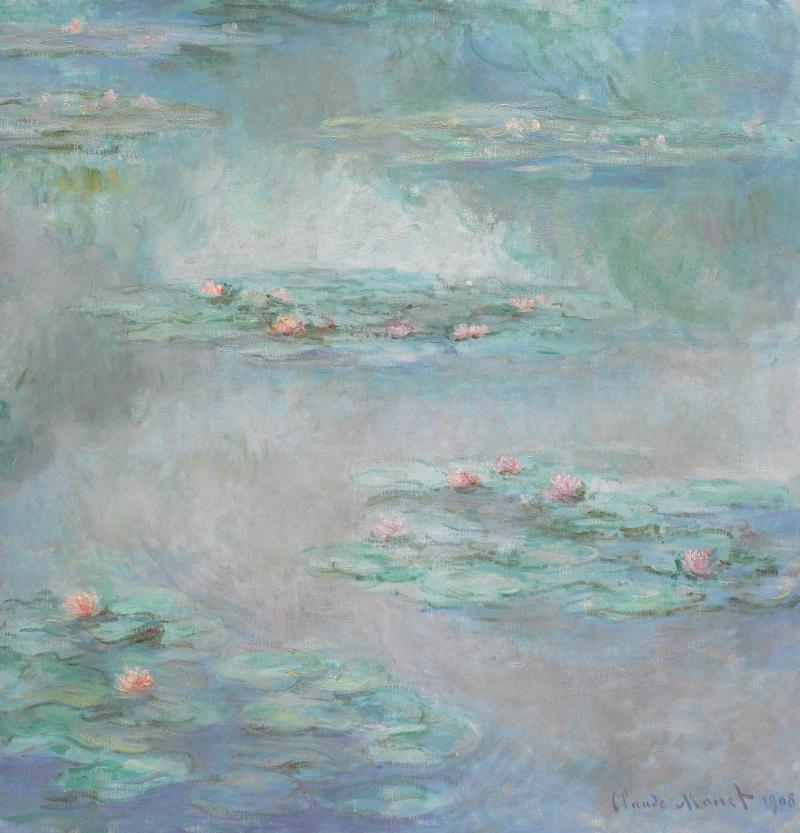Long-Unseen Masterpieces by Monet & Modigliani to Lead London Flagship Sales
 Joan Miró, Peinture (L’…000). - Mit freundlicher Genehmigung von: sothebys.com
Joan Miró, Peinture (L’…000). - Mit freundlicher Genehmigung von: sothebys.comWas: Auktion
Wann: 19.06.2019 - 20.06.2019
Claude Monet, Nymphéas, 1908, oil on canvas (est. £25,000,000-35,000,000 / $31,880,000-44,630,000)
Thomas Boyd-Bowman, Head of Sotheby’s Impressionist & Modern Art Evening Sales in London, said:“This beautifully lyrical and softly ephemeral Nymphéas painted in 1908 is a timeless reflection of Monet’s vision and innovation. Acquired in 1932, it has remained a hidden treasure in the same family collection for decades and will now make its very first appearance at auction.”
Monet’s iconic series paintings – long considered the apogee of Impressionism – have in the past year reached new heights in the market. Most recently, at Sotheby’s in New York, his glowing haystacks from 1890 became the first work of impressionist art to exceed $100 million at auction, mere months after a record for a Venetian view was set at Sotheby’s in London.
The most famous images of all remain those of Monet’s beloved waterlilies, which have left an indelible mark on the history of art and become entrenched in the public consciousness. The artist’s first steps towards true abstraction, this ground-breaking series is widely considered his greatest achievement.
Monet’s meticulously designed water garden in Giverny verged on an all-consuming obsession, as the artist diverted the course of the river near his home and waded out into the waters daily to preserve the pristine beauty of the waterlilies. The result was a kaleidoscope of colour on his doorstep, forever changing with an unending variety of tones and forms.
Amongst Monet’s most desirable waterlilies are those from the period between 1904 – 1909, when Monet stripped away the banks of the pond, eliminated the horizon line and transformed the water into a mirror for the sky. With its decidedly free brushwork, this painting represents the most sophisticated qualities of his earlier, precise explorations whilst anticipating the innovations that were to follow in the Grandes Décorations housed in the Musée de l'Orangerie in Paris.
This stunning example of the Nymphéas series comes to auction along with two other works from the same collection – one an earlier work by Monet, depicting the astonishingly rich fields around Giverny in the spring of 1885; the other a dazzling pointillist depiction of the landscape surrounding Pissarro's home in a bucolic neighbouring village of Eragny, which he had purchased with financial aid from Monet.
Amedeo Modigliani, Jeune homme assis, les mains croisées sur less genoux, 1918, oil on canvas (est. £16,000,000-24,000,000 / $20,400,000-30,600,000)
James Mackie, Head of Sotheby’s Impressionist & Modern Art Department in London, said:“A tender and transfixing image of a youth, this intimate portrait presents an unidentified young model with a sense of empathy, poignancy and serene beauty characteristic of the artist’s most accomplished paintings. The work was bought directly from the artist’s dealer Léopold Zborowski in 1927, and has been in the same family collection since then. For decades it has only been published as a black and white image, and will now emerge in its full splendour at auction this month.”
Modigliani’s transcendent portraits of anonymous youths are among the rarest in his oeuvre, with just a handful of depictions of such male sitters known – many of which are housed in museums across the world.
Towards the end of the First World War, as his health worsened, Modigliani sought safety and solace in the French Riviera. During his time in Provence, the artist felt a close connection to Cézanne and the legacy of his great portraits, an influence that is felt in these works. Having spent years immersed in the bohemian circles of Paris, in Nice and Cagnes Modigliani turned to painting anonymous sitters, executing a number of sublime portraits of peasants, servants, shop girls and children. The figures are ennobled with Modigliani’s elegance, but not at the cost of their innate character and humanity. With his mannerist elongated features and almond-shaped, vacant eyes, the model presents a powerful synthesis of all the characteristic traits that make Modigliani’s portraits so immediate and universal.
Joan Miró, Peinture (L’Air), 1938, oil on canvas (est. £10,000,000 – 15,000,000 / $12,750,000-19,125,000)
Populated by playful creatures and animated shapes painted in bold primary tones, Miró’s Peinture (L’Air) resonates with a vibrant energy as it offers hopefulness in the face of the struggles of the Spanish Civil War. Part of a hugely important body of work where the artist engaged with the deteriorating political situation in his native country, the work offers insight into the artist’s state of mind during his exile in France. It was painted in the moment that saw the height of his engagement with political themes, the year after his monumental panel for the Spanish Pavilion was shown alongside Picasso’s Guernica at the 1937 World Fair in Paris.
The palette is restricted to the red, yellow and blue of the Estelada – the Catalan flag of independence – and the figures have been liberated from the oppression of the terrestrial realm and given the freedom of the sky. The inventive yet rigorously organised composition offers a renunciation of despair with a celebration of colour and form.
Tags: Claude Monet, Impressionismus, Joan Miró, Moderne Kunst.
Copyright © 2025 findART.cc - All rights reserved








 Claude Monet, Nymph…000) - Mit freundlicher Genehmigung von: sothebys.com /
Claude Monet, Nymph…000) - Mit freundlicher Genehmigung von: sothebys.com /